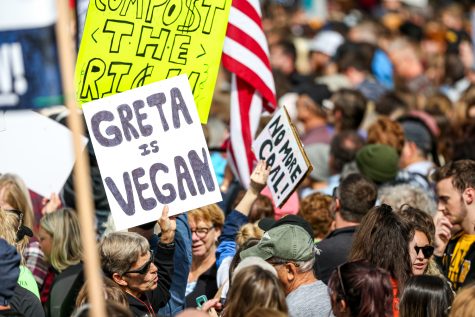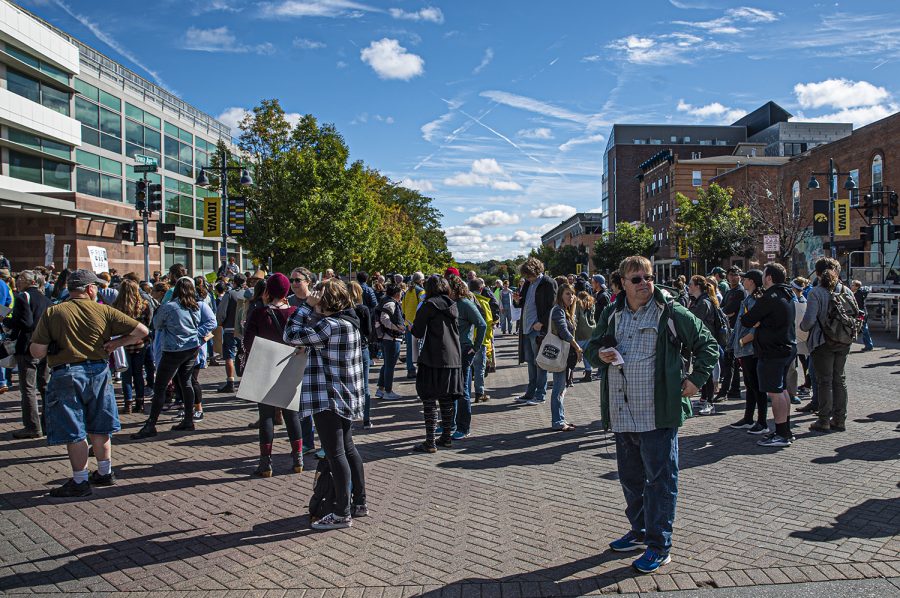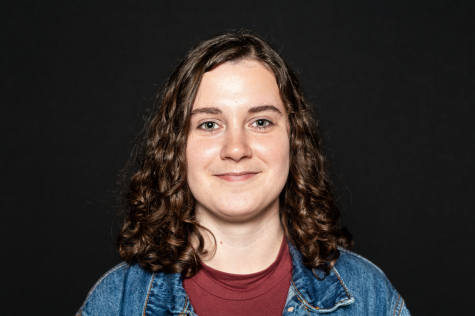Iowa City activists want ‘no more excuses’ from UI on climate action; UI turns to coal-free-by-2025 pledge
“We do all need to work together on climate change,” UI Senior VP for Finance and Operations Rod Lehnertz told the DI after Greta Thunberg’s visit.
Iowa City citizens gather downtown to listen to Greta Thunberg speak on Friday, October4th, 2019. Greta Thumberg is a teenage climate change activist speaking at a local climate strike.
October 4, 2019
After a visit to Iowa City by 16-year-old Swedish climate activist Greta Thunberg, a University of Iowa administrator on Oct.4 said community members and the UI need to partner to address the issue of climate change.
Speaking with The Daily Iowan on the Pentacrest, just a block away from the climate-strike location at Iowa Avenue and Dubuque Street, UI Senior Vice President for Finance and Operations Rod Lehnertz said, “We do all need to work together on climate change.”
“… The University of Iowa looks forward to working on that and also still remaining realistic in our efforts to do so. Shutting off the Power Plant is not an option, but how to do the right thing by our university, by our community, by our universe, we should aim to do and do it together, and not at odds.”
Iowa City climate activists have demanded the UI stop burning coal, taking issue with the coal plant’s contributions to carbon-dioxide emissions, which they say factor into heart, respiratory, and related diseases and deaths.
Asked why it would not be feasible to get the UI off of using coal sooner than 2025, Lehnertz touted the UI’s leadership in using unique sources of biomass fuel — such as Miscanthus grass, oat hulls, wood chips, and green-energy pellets. He pointed to the university’s pledge to be coal-free by 2025.
“To simply turn off the Power Plant is not a very realistic measure to keep the campus operating,” he said. “But to continue down a path that is more and more a leader on biofuels and able to remove our responsibility of coal not only is our commitment, but I think is a good commitment … I don’t know that everybody in an audience who might say ‘get rid of coal’ this afternoon is aware of that. They may be, but … the institution’s commitment is to reel attention to the climate and the importance of the climate.”
Lehnertz said the university has taken steps toward achieving that goal, such as shifting the Office of Sustainability into the colleges instead of having it continue to function as its own service unit. As an academic unit, he said, the UI’s sustainability efforts involve students and contribute to the issue to the UI’s research mission.
Thunberg did not call for the UI to shut down the coal plant during her appearance in Iowa City, but other activists took the stage to urge its end.
The crowd gathered downtown called for action from UI President Bruce Harreld personally, with the activists on stage chanting “President Harreld” and the thousands in the crowd responding, “No more excuses.”

Protesters fill the intersection of Iowa Avenue and Dubuque Street to hear Swedish climate activist Greta Thunberg speak at the Iowa City Climate Strike in downtown on Oct. 4.
While the UI pointed to its future coal-free plan in response to climate change, UI police officers stood on the Pentacrest and a couple of officers stood outside Jessup Hall, where the President’s Office is located.
Asked about the UI police’s contributions to security for the Thunberg’s appearance, university media-relations manager Hayley Bruce said, “We are supporting the city of Iowa City and the Iowa City Police Department. The University of Iowa Police Department does not discuss their event-security procedures in detail for safety reasons.”
Harreld has not directly addressed the climate strikers, the student organizers told the DI, but he has taken a stance on the issue in the past.
The UI president signed onto an open letter in 2016 after Donald Trump’s election as U.S. president urging the Trump administration and members of Congress to support participation in the Paris Agreement, climate research, and investment in the low-carbon economy. A group of higher-education institutions and the Boston-based nonprofit Second Nature organized the letter.
“This is the most important issue facing the next generation,” the organization reported Harreld said. “The science is clear. Now is the time to act … while we still can.”
Harreld in 2017 said the UI by 2025 expects to have diminished its reliance on coal “to the point it is no longer included in our fuel portfolio.”
“The university will continue to pursue and develop its innovative renewable energy program to ensure an abundant supply of alternative sources of energy,” he said. “It’s the right choice for our students and our campus, and it’s the surest path to an energy-secure future.”















